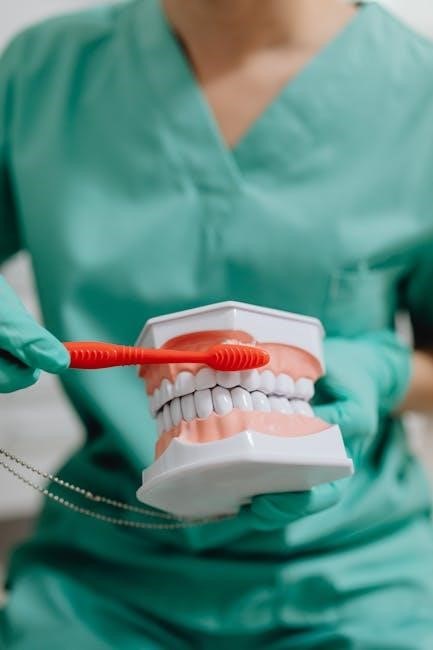Oticon hearing aids, available through the NHS, offer advanced solutions for hearing loss, featuring innovative BrainHearing technology and adaptable listening settings for personalized sound quality and comfort.
What Are Oticon Hearing Aids?
Oticon hearing aids are innovative devices designed to improve hearing clarity and comfort, featuring cutting-edge technology like BrainHearing and Intent. They adapt to users’ listening needs, offering personalized sound quality. Available through the NHS, Oticon aids include discreet in-the-ear models and advanced behind-the-ear options. These devices prioritize user comfort and speech recognition, ensuring a natural listening experience. With a focus on brain support, Oticon hearing aids are tailored to enhance how the brain processes sound, making them a popular choice for those seeking effective hearing solutions.
Types of Oticon Hearing Aids Available Through the NHS
The NHS offers a variety of Oticon hearing aids, including behind-the-ear (BTE) and in-the-ear (ITE) models. Oticon Own is a discreet ITE option, while Oticon Intent provides advanced adaptability. These devices are designed to meet diverse hearing needs, ensuring comfort and effectiveness. Each type is tailored to specific lifestyles, offering solutions for mild to severe hearing loss. With a focus on innovation, Oticon hearing aids through the NHS cater to individual preferences and requirements, providing high-quality auditory support.
- Behind-the-ear models for versatility.
- In-the-ear styles for discreetness.
- Advanced models with adaptive technology.
Key Features of Oticon Hearing Aids
Oticon hearing aids are renowned for their advanced BrainHearing technology, which prioritizes the brain’s ability to process sound. They offer adaptive listening settings, adjusting to environments automatically. The Oticon Intent model adapts to individual listening needs, ensuring clear sound in diverse situations. These devices also feature connectivity options, enabling seamless integration with smartphones and other devices. Their compact designs combine discreetness with powerful functionality, making them suitable for various lifestyles. Battery life is optimized for long-lasting use, and sustainability efforts are evident in eco-friendly designs. These features collectively enhance user experience, providing comfort, clarity, and convenience.
- BrainHearing technology for better sound processing.
- Adaptive listening settings for dynamic environments.
- Connectivity options for smartphone integration.
- Eco-friendly and sustainable designs.

Eligibility for NHS Oticon Hearing Aids
Eligibility for NHS Oticon hearing aids is determined by meeting specific hearing loss criteria through an NHS assessment by an audiologist or hearing specialist.
Who Qualifies for NHS Hearing Aids?
Eligibility for NHS hearing aids, including Oticon models, is based on assessment results indicating significant hearing loss impacting daily life. Adults and children with clinically measurable hearing impairments qualify. The NHS provides hearing aids to those demonstrating a clear need, as determined by an audiologist or hearing specialist during a formal assessment. This service is free of charge, ensuring equal access to hearing support regardless of financial status. Individuals must be referred by a healthcare professional to begin the evaluation process.
How to Get Assessed for Hearing Aids
To get assessed for NHS hearing aids, including Oticon models, individuals must first be referred by a healthcare professional, such as a GP or audiologist. The assessment process involves a comprehensive hearing evaluation to measure the degree and type of hearing loss. Audiologists use advanced tools to determine the severity of impairment and its impact on daily communication. Following the assessment, the results are discussed, and suitable hearing aid options are recommended based on lifestyle and hearing needs; The NHS ensures this process is accessible and free for those eligible, providing tailored support for improved hearing outcomes.
What to Expect During the Assessment Process
During the NHS hearing aid assessment, an audiologist will conduct a detailed hearing evaluation, including tests to measure hearing thresholds and speech recognition. A physical examination of the ear may also be performed to rule out any medical issues. The audiologist will discuss lifestyle and communication needs to tailor recommendations. The process is non-invasive and designed to identify the most suitable hearing aid solution. Results are explained clearly, and if eligible, options like Oticon hearing aids may be suggested. The goal is to ensure individuals receive personalized support for their hearing needs, with follow-up care provided post-fitting.
How to Use Oticon Hearing Aids
Turn on the hearing aids, adjust settings via the Oticon app, and ensure proper fit. Regularly clean and charge batteries for optimal performance and sound quality.
First-Time Setup and Activation
Insert batteries, turn on the hearing aids, and ensure they are properly fitted. Use the Oticon app to complete the initial setup, adjusting settings as guided. Test the sound quality in different environments to ensure optimal performance. If issues arise, refer to the provided instructions or contact your audiologist for assistance. Regularly update the app for the latest features and improvements. Proper activation ensures personalized sound quality and comfort, enhancing your hearing experience with Oticon technology.
Adjusting Settings for Optimal Sound Quality
Use the Oticon app to customize sound settings, such as volume, treble, and bass, for personalized hearing experiences. Enable features like noise reduction and speech clarity to enhance listening in various environments; Adjust the settings based on feedback from your surroundings, ensuring comfort and clear sound. Regularly update the app to access new features and improvements. Experiment with different presets for specific situations, like meetings or outdoor settings, to optimize sound quality. If needed, consult your audiologist for further fine-tuning to match your hearing needs and preferences.
Regular Maintenance and Care Tips
Keep your Oticon hearing aids in optimal condition by cleaning them daily with a soft cloth and avoiding exposure to moisture. Use a drying kit to remove moisture and prevent damage. Regularly check for wax buildup and clean the earpieces and microphones. Replace batteries as needed and store them in a cool, dry place. Avoid using harsh chemicals or extreme temperatures. Store your hearing aids in a protective case when not in use. Schedule regular checkups with your audiologist to ensure proper functioning and address any issues promptly. Use the Oticon app for maintenance reminders and troubleshooting tips.
Advanced Features of Oticon Hearing Aids
Oticon hearing aids feature BrainHearing technology, Oticon Intent for adaptive listening, and advanced connectivity options, ensuring personalized sound processing and seamless integration with modern devices for enhanced user experience.
Understanding BrainHearing Technology
BrainHearing Technology, developed by Oticon, is designed to support the brain’s natural processes in understanding sound. By focusing on how the brain interprets auditory signals, this technology reduces listening effort, improving speech clarity and focus in noisy environments. It prioritizes sounds that are most important, such as conversations, while minimizing background noise. This innovative approach ensures a more natural hearing experience, enabling users to engage effortlessly in daily interactions. The technology is seamlessly integrated into Oticon hearing aids, making it a cornerstone of their advanced solutions for hearing loss, especially for NHS users seeking effective and intuitive hearing support.
How Oticon Intent Adapts to Listening Needs
Oticon Intent is a groundbreaking technology that intuitively understands and adapts to a user’s listening intentions. By analyzing the environment and the user’s focus, it automatically adjusts settings to prioritize relevant sounds, such as speech, while reducing background noise. This real-time adaptation ensures a more natural and effortless listening experience. Designed to meet individual preferences, Oticon Intent learns and evolves with the user, providing personalized sound quality in various settings. This advanced feature is particularly beneficial in complex auditory environments, making it a significant innovation in Oticon’s NHS-provided hearing aids, enhancing clarity and reducing listening effort for users.
Connectivity Options for Oticon Hearing Aids
Oticon hearing aids offer seamless connectivity options, enabling users to connect to various devices like smartphones, TVs, and more. Through advanced Bluetooth technology, users can stream calls, music, and media directly to their hearing aids. Additionally, Oticon’s wireless accessories, such as remote microphones and TV adapters, enhance listening experiences in different environments. These connectivity features ensure effortless communication and entertainment, providing users with a more integrated and convenient hearing solution. By linking hearing aids to personal devices, Oticon empowers users to stay connected and engaged in their daily lives with ease and clarity.
Troubleshooting Common Issues
Oticon hearing aids may experience feedback, connectivity issues, or battery problems. Regular cleaning, restarting devices, and consulting user guides can often resolve these common concerns effectively.
Resolving Feedback or Whistling Sounds
Feedback or whistling sounds in Oticon hearing aids can be caused by improper fit, earwax, or high volume settings. To resolve this, ensure the hearing aid fits securely, clean it regularly to remove debris, and adjust volume levels. If issues persist, consult an audiologist for professional calibration. Additionally, Oticon’s advanced feedback suppression technology can help minimize these sounds. Regular maintenance and proper care are essential to prevent recurring problems and ensure optimal performance of the device.
Fixing Connectivity Problems
Connectivity issues with Oticon hearing aids can occur due to Bluetooth interference, outdated software, or incorrect device pairing. To resolve this, restart both the hearing aids and the connected device. Ensure Bluetooth is enabled and that the hearing aids are properly paired. Check for software updates in the Oticon ON app, as newer versions often improve connectivity. If problems persist, reset the hearing aids by turning them off and on again. Additionally, move away from potential interference sources like Wi-Fi routers or other electronic devices. Proper troubleshooting steps can restore seamless connectivity for optimal performance.
Dealing with Battery Life Issues
Oticon hearing aid battery life can be affected by moisture, storage conditions, and usage patterns. To extend battery life, ensure hearing aids are turned off when not in use and store batteries in a cool, dry place. Avoid exposing batteries to extreme temperatures or humidity. Clean the battery contacts regularly to prevent corrosion. Replace batteries if they are old or expired, as this can impact performance. If issues persist, consider using a hearing aid dehumidifier to maintain optimal conditions. Always follow the manufacturer’s guidelines for battery care and replacement to maximize longevity and reliability.
Additionally, check the battery compartment for proper alignment and ensure the battery door is closed securely. If using rechargeable batteries, charge them according to the recommended schedule. If battery life remains short, consult an NHS hearing specialist for further assistance or possible battery replacement.
NHS Policies on Hearing Aid Provision
The NHS provides Oticon hearing aids to eligible individuals, ensuring access to advanced technology like BrainHearing and Oticon Intent for improved hearing support and care.
Overview of NHS Hearing Aid Services
The NHS provides comprehensive hearing aid services, including assessments, fittings, and follow-up care, to ensure individuals receive appropriate support for their hearing needs. Eligibility is determined through audiological evaluations, with a focus on addressing significant hearing loss. The NHS offers advanced hearing aids, such as Oticon models, featuring BrainHearing technology and adaptive listening capabilities. These devices are designed to enhance sound clarity and comfort, catering to diverse hearing requirements. The NHS also ensures affordability and accessibility, with services covered under its funding schemes, making high-quality hearing solutions available to those in need while protecting patient interests in competitions and mergers.
Replacement and Repair Policies
The NHS provides clear guidelines for replacing or repairing Oticon hearing aids. If a hearing aid is damaged, lost, or no longer functions properly, patients can contact their local audiology department for assistance. Repairs are typically covered under NHS funding, ensuring affordability. Replacement aids are provided if the current device is beyond repair or outdated. The process involves an assessment to confirm the need for a new device. The NHS aims to ensure continuous hearing support, with policies designed to minimize disruptions and maintain optimal hearing health for users. This service underscores the NHS’s commitment to accessible and sustainable hearing care solutions.
What is Covered Under NHS Funding
NHS funding covers the assessment, fitting, and provision of Oticon hearing aids, ensuring access to high-quality devices for eligible individuals. This includes repairs and replacements if the hearing aids are damaged or no longer functional. The NHS also covers follow-up care and adjustments to ensure optimal performance. Key features like BrainHearing technology and Oticon Intent, which adapt to individual listening needs, are included in the funding. The NHS prioritizes comprehensive hearing support, making advanced hearing solutions affordable and accessible to those in need. This commitment ensures users receive the latest innovations in hearing care without additional costs.

Benefits of Using Oticon Hearing Aids
Oticon hearing aids enhance sound clarity, improve speech recognition, and offer discreet designs, providing users with natural listening experiences and increased confidence in various environments.
Improved Sound Clarity and Comfort
Oticon hearing aids deliver exceptional sound clarity and comfort, leveraging advanced BrainHearing technology to process sound naturally. They reduce background noise and enhance speech recognition, ensuring clear communication in noisy environments. The aids are designed to adapt to individual listening preferences, providing a personalized hearing experience. Users report higher comfort levels due to their ergonomic designs and lightweight construction. Oticon’s focus on user-centric innovation ensures that wearers enjoy improved auditory comfort and clarity, making daily interactions more enjoyable and stress-free. These features contribute to overall satisfaction and confidence in various social and professional settings.
Enhanced Speech Recognition
Oticon hearing aids excel in enhancing speech recognition, particularly in challenging environments. By leveraging BrainHearing technology, they prioritize and clarify speech, reducing background noise interference. This advanced processing ensures users can focus on conversations more easily, even in noisy settings. Oticon Intent adapts to individual listening needs, further improving speech understanding. The aids also support real-time adjustments, allowing wearers to optimize sound settings for clearer dialogue. Enhanced speech recognition fosters confidence in communication, enabling users to engage fully in social and professional interactions without missing crucial details. This feature is a key benefit for those seeking improved hearing clarity and comprehension.
Discreet and Stylish Designs
Oticon hearing aids are designed to be both discreet and stylish, offering a range of options to suit individual preferences. The Oticon Own hearing aids, for example, are crafted to blend seamlessly with the ear’s natural shape, providing a nearly invisible appearance. Sleek and compact designs ensure comfort without compromising on aesthetics. Available in various colors and styles, these aids cater to diverse tastes, from subtle to more noticeable options. Their lightweight and ergonomic construction enhances wearability, making them a practical choice for everyday use. This focus on design ensures users can enjoy advanced hearing technology while maintaining a natural and polished look.
How to Obtain Oticon Hearing Aids Through the NHS
To obtain Oticon hearing aids through the NHS, individuals must undergo a hearing assessment by an NHS audiologist, who will determine suitability and facilitate the fitting process.
Step-by-Step Application Process
To obtain Oticon hearing aids through the NHS, start by consulting your GP, who will refer you to an NHS audiology department. Schedule an appointment for a hearing assessment to evaluate your hearing loss. During the assessment, an audiologist will discuss your needs and recommend suitable Oticon models. If eligible, you’ll be fitted with the hearing aids, and adjustments will be made for comfort and clarity. After fitting, follow-up appointments are arranged to ensure proper use and address any concerns. This streamlined process ensures access to advanced hearing solutions tailored to your specific requirements.
What to Expect After Fitting
After fitting, you will receive personalized instructions on using and caring for your Oticon hearing aids. Follow-up appointments with your audiologist will ensure proper adjustment and address any concerns. Expect guidance on optimizing settings for different environments and connecting to external devices. Oticon’s advanced features, like BrainHearing technology, will be tailored to enhance your listening experience. Regular check-ups and maintenance will be scheduled to monitor progress and ensure long-term satisfaction. The NHS also provides ongoing support to help you adapt to your new hearing aids and improve communication in various settings.
Follow-Up Care and Support
After receiving your Oticon hearing aids through the NHS, you will have access to comprehensive follow-up care and support. Audiologists will schedule regular check-ups to ensure your hearing aids are functioning optimally and address any issues. You will receive guidance on maintaining your devices, troubleshooting common problems, and maximizing their performance. The NHS also provides resources for adapting to your hearing aids, including tips for handling different listening environments. Additionally, support for connectivity features and advanced technologies like BrainHearing will be available to enhance your overall experience and ensure long-term satisfaction with your Oticon hearing aids.

Comparing Oticon Hearing Aids to Other Brands
Oticon hearing aids stand out for their innovative BrainHearing technology and adaptive Intent features, offering superior sound quality and user satisfaction compared to other brands.
Differences in Technology and Features
Oticon hearing aids excel with their BrainHearing technology, which prioritizes the brain’s ability to process sound over mere amplification. Unlike other brands, Oticon Intent adapts in real-time to the wearer’s listening intentions, optimizing sound quality in dynamic environments. Oticon Own offers a discreet in-the-ear design with advanced connectivity options, setting it apart from competitors. Additionally, Oticon’s eco-friendly designs and focus on sustainability make them a standout choice. These innovations ensure Oticon hearing aids provide superior sound clarity, comfort, and adaptability compared to other brands, catering to diverse hearing needs with cutting-edge solutions.
User Satisfaction and Reviews
Oticon hearing aids have received high satisfaction rates, with users praising their advanced features and comfort. The Oticon Intent and Oticon Own models are particularly popular, offering improved sound clarity and discreet designs. Many users appreciate the innovative BrainHearing technology, which enhances speech recognition and adapts to real-world listening environments. Reviews highlight the seamless connectivity options and eco-friendly designs as standout features. Overall, Oticon hearing aids are highly regarded for their performance, style, and user-centric approach, making them a preferred choice for those seeking effective and stylish hearing solutions through the NHS.
Cost-Effectiveness and Value
Oticon hearing aids offer exceptional value, blending advanced technology with affordability. Through the NHS, these devices are cost-effective, as they are funded under the NHS hearing aid provision, eliminating out-of-pocket costs for eligible patients. Oticon’s innovative features, such as BrainHearing technology, provide long-term benefits, enhancing hearing outcomes and reducing the need for frequent adjustments or replacements. While the acquisition by Cochlear Limited may impact pricing, NHS coverage ensures affordability. Users consistently report high satisfaction, making Oticon hearing aids a cost-effective and valuable choice for improving hearing health without financial strain.

Future of Oticon Hearing Aid Technology
Oticon is advancing hearing aid technology with AI integration and eco-friendly designs. The launch of Oticon Intent highlights their commitment to innovative, sustainable solutions for hearing health.
Upcoming Innovations in Hearing Aids
Oticon is leading the way with cutting-edge advancements, including AI-driven hearing aids that adapt to user intent and real-time sound processing. The new Oticon Intent line uses BrainHearing technology to prioritize speech clarity in noisy environments. Additionally, Oticon Own offers discreet, in-the-ear designs with enhanced noise filtering and music enjoyment features. Future models are expected to integrate sustainable materials and advanced connectivity options, ensuring better accessibility and comfort for users. These innovations aim to redefine hearing aid technology, focusing on personalization, sustainability, and seamless integration into daily life.
Impact of AI on Hearing Aid Technology
AI is revolutionizing hearing aid technology, enabling devices like Oticon Intent to adapt to users’ listening intentions in real-time. By leveraging AI, hearing aids can now prioritize speech clarity in noisy environments, automatically adjusting settings for optimal sound quality. AI-driven algorithms also enhance noise filtering and speech recognition, providing a more natural listening experience. Future advancements may include AI-powered sound classification and predictive audio processing, further personalizing hearing aid performance. These innovations ensure that hearing aids not only amplify sound but also intelligently adapt to the wearer’s unique auditory needs, offering unparalleled comfort and clarity.
Sustainability and Eco-Friendly Designs
Oticon is committed to sustainability, prioritizing eco-friendly materials and energy-efficient manufacturing processes. Their hearing aids are designed with recyclable components, reducing environmental impact. Oticon Own, their latest in-the-ear models, feature durable, long-lasting construction to minimize waste. The company also focuses on sustainable packaging and responsible supply chain practices. By integrating innovative technology with eco-conscious design, Oticon aims to promote greener hearing solutions without compromising performance. Their efforts reflect a broader commitment to environmental stewardship, aligning with global sustainability goals and offering users a responsibly crafted product that supports both hearing health and the planet.
Oticon hearing aids, supported by the NHS, offer life-changing solutions with advanced technology and eco-friendly designs, emphasizing proper usage and care for optimal long-term benefits and satisfaction.
Final Thoughts on Oticon Hearing Aids
Oticon hearing aids, provided through the NHS, have proven to be a game-changer for many, offering exceptional sound clarity, comfort, and advanced features like BrainHearing technology. Users praise their discreet designs and ability to adapt to various listening environments. With continuous innovation, Oticon remains at the forefront of hearing aid technology, ensuring improved speech recognition and personalized experiences. The NHS’s support in providing these aids highlights their commitment to accessibility and quality healthcare. For those struggling with hearing loss, Oticon hearing aids are a reliable choice, promising enhanced communication and a better quality of life.
Importance of Proper Usage and Maintenance
Proper usage and maintenance of Oticon hearing aids are crucial for ensuring optimal performance and longevity. Regular cleaning of the devices, especially the microphone and speaker, prevents wax buildup and debris. Storing the aids in a dry, cool place when not in use helps maintain their functionality. Replacing batteries as needed and avoiding exposure to harsh chemicals or water is essential. Following the NHS guidelines and manufacturer recommendations ensures the aids continue to provide clear sound quality and comfort. Proper care not only extends the life of the hearing aids but also supports better hearing health for users.
Encouraging Others to Seek Hearing Support
Encouraging others to seek hearing support is vital for improving their quality of life. Many individuals delay addressing hearing loss due to stigma or unawareness of solutions. Oticon hearing aids, particularly through the NHS, offer advanced technology like BrainHearing and Oticon Intent, which adapt to individual listening needs. Highlighting the benefits of early intervention, such as improved communication and social interaction, can motivate others to take action. Sharing personal experiences or successes with Oticon aids can inspire confidence and reduce hesitancy. By spreading awareness, we empower others to embrace hearing support and enjoy a fuller, more connected life.
